
December 19
1897 Birth: Louis Darquier de Pellepoix, in France:
Darquier was an infamous and devout antisemite who believed that all Jews should either be kicked out of France or exterminated. In May 1942 he was appointed to head the Vichy government's Office for Jewish Affairs. He replaced Xavier Vallat in that position, who had been removed because the SS in France had considered Vallat to be too moderate in his views and actions. Darquier persecuted French Jewry in a brutal and violent fashion. In conjunction with the German authorities in Paris, he accelerated the confiscation of Jewish property and helped coordinate the deportation of French Jews to Auschwitz. However, the Germans soon found that Darquier's administration was inefficient, incompetent, and corrupt. Thus, he was also removed from his position in February 1944.
After the war, Darquier fled to Spain, where he lived until his death in 1980. In 1978 he was interviewed in his home by a French reporter. During the interview Darquier denied any involvement in the persecution of France's Jews during the Holocaust, and even denied that the Holocaust ever took place.
1906 Birth: Leonid Ilyich Brezhnev—in Ukraine—first Secretary of the Community Party, President of the USSR.
Leonid Brezhnev, the son of a steelworker, was born in Kamenskoye, in the Soviet Union in 1906. He joined the Komsomol (Communist Youth Organization) in 1923 and trained as an agricultural surveyor. In 1931 Brezhnev joined the Communist Party (CPSU). In 1938 he was appointed party political chief at Dnepropetrovsk where he worked under Nikita Khrushchev. During the Second World War Brezhnev served as political commissar to the Southern Army.
After the war Brezhnev became party boss in Moldavia. He successfully brought the new republic under the control of the Communist Party. This impressed Joseph Stalin and in 1952 he was invited to join the Politburo. The following year Stalin died and without his support Nikita Khrushchev was able to send Brezhnev to Kazakhstan. In 1964 Khrushchev was ousted and Brezhnev was able to return to the Politburo. By the early 1970s Brezhnev had emerged as the most important political figure in the Soviet Union. As well as being First Party Secretary of the Communist Party he was also President of the Supreme Soviet. During his period in power the Soviet Union economy stagnated and the much needed reforms had to wait until after Leonid Brezhnev's death in 1982.
1915 World War I: Haig becomes commander-in-chief of the British army in France:
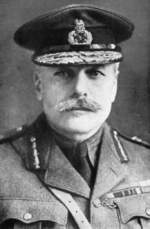
In the wake of the British defeat at the Battle of Loos in September 1915, Sir Douglas Haig replaces Sir John French as commander-in-chief of all British forces on the Western Front.
Haig, who commanded the 1st Army of the British Expeditionary Force (BEF) at Loos, had asked French to authorize the release of two reserve divisions before the battle. French eventually consented, but due to disorganization and the long distance they had to travel, the reserves arrived too late to make a difference. The offensive at Loos ended in failure, and the incident contributed to French's removal from his position in December in favor of Haig, who enjoyed some influence with King George V.
The controversial Haig served as commander of the BEF through the end of the war—from devastating battles at Verdun and the Somme to the Allied offensives in 1918 that would lead to victory—despite criticism from such formidable detractors as British Prime Minister David Lloyd George, who wrote later that at times he wondered if he should have resigned rather than allow Haig to pursue his strategy. (History.com)
1916 World War I: From New York, Paul Warburg sends a letter to his brother, Max Warburg, in Germany, telling him that the Allies have nearly exhausted the market for American loans, but that unrestricted U-boat warfare would foster sympathy and expand the market. (THP)
1917 Russian Revolution: Lazar Kaganovich meets Kliment Voroshilov and Sergo Ordzhonikidze, acquaintances of his two older brothers, Mikhail and Yuri, who are now living in Arzamas. Mikhail is also a close friend of Nikolai Bulganin, whom Lenin considers one of the Bolshevik's leading theorists. (THP)
1922 Various:
Antisemitism: Romania: Restrictions are imposed on the percentage of Jewish students allowed at Cluj University. Other universities, at Jassy, Bucharest and Czernowitz soon restrict Jewish attendance, and Jewish students are attacked. (THP)
Volkishness: Detlef Schmude, one of Jorg Lanz von Liebenfel's most ardent supporters in Germany and the Prior of Hollenberg, begins publishing a second Ostara series. The first issue Die Ostara und das Reich der Blonden reiterates the "Ario-Christian" canon with numerous quotes from Lanz: "racial history is the key to the understanding of politics," and "all ugliness and evil stems from interbreeding." (THP)
1923 Volkishness: Friedrich Franz von Hochberg (Frowin), Presbyter of the ONT priory at Hollenbeck, states that the Order of the New Templars is his sole comfort "in this evil land of pygmies and Tschandale." (THP)
1928 Stalin speaks on the problems of the German Communist Party:
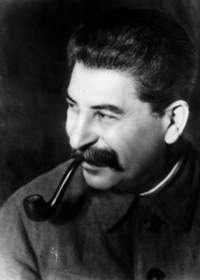
Is the German Communist Party to be or not to be organised and united, with an iron internal discipline? . . . . that is the question, comrades. It is a question not only of the Rights or of the conciliators, but of the very existence of the German Communist Party. There is a German Communist Party. But alongside and within the German Communist Party there are two forces which are disintegrating the Party from within and creating a threat to its existence. They are, firstly, the Right faction, who are organising within the Communist Party a new, anti-Leninist party, with its own centre and its own press organs, and who day after day are violating its discipline. They are, secondly, a group of conciliators whose vacillations are strengthening the Right faction. I shall not stop to show that the Right faction is breaking with Marxism-Leninism and waging a desperate struggle against the Comintern. That was shown long ago. Nor shall I stop to show that the group of conciliators are violating the Sixth Congress resolution on waging a systematic fight against the Rights. That, too, was shown long ago. The point now is that this situation in the German Communist Party cannot be tolerated any longer.
1932 Countdown to Infamy: Japan unilaterally denounces the naval agreements signed at the disarmament conferences of 1922 and 1930.
1939 World War II: Winter War: A Russian air and ground attack against Finnish positions near Summa takes place.
1941 World War II: Various:
Hitler takes command of the German army:
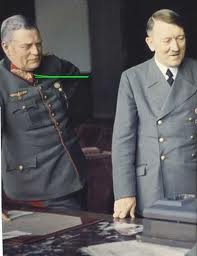
On this day, in a major shake-up of the military high command, Adolf Hitler assumes the position of commander in chief of the German army.
The German offensive against Moscow was proving to be a disaster. A perimeter had been established by the Soviets 200 miles from the city—and the Germans couldn't break through. The harsh winter weather—with temperatures often dropping to 31 degrees below zero—had virtually frozen German tanks in their tracks. Soviet General Georgi Zhukov had unleashed a ferocious counteroffensive of infantry, tanks, and planes that had forced the flailing Germans into retreat. In short, the Germans were being beaten for the first time in the war, and the toll to their collective psyche was great. "The myth of the invincibility of the German army was broken," German General Franz Halder would write later.
But Hitler refused to accept this notion. He began removing officers from their command. General Fedor von Bock, who had been suffering severe stomach pains and who on December 1 had complained to Halder that he was no longer able to "operate" with his debilitated troops, was replaced by General Hans von Kluge, whose own 4th Army had been pushed into permanent retreat from Moscow. General Karl von Runstedt was relieved of the southern armies because he had retreated from Rostov. Hitler clearly did not believe in giving back captured territory, so in the biggest shake-up of all, he declared himself commander in chief of the army. He would train it "in a National Socialist way"—that is, by personal fiat. He would compose the strategies and the officers would dance to his tune. (History.com)
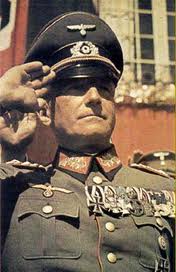
General Walther von Brauchitsch is dismissed when Hitler assumes supreme command of the German armed forces.
War at Sea: Three Italian Royal Navy manned torpedoes detonated limpet mines on British Royal Navy ships, sinking two battleships. [For further details, Click here.]
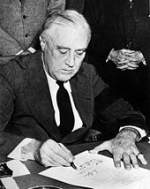
USA: Twelve days after Pearl Harbor, Franklin D. Roosevelt under authority of US Congress, creates the Office of Censorship. The bureau has discretion over communications with foreign countries and to control information pertaining to the war. Participation by domestic publishers is 'voluntary.'
Flying Tigers, a group of volunteer pilots under General Claire L. Chennault, set up headquarters 150 miles from Rangoon, Burma. From December 19, 1941, to July 4, 1942, they will destroy 297 Japanese planes and kill 500 of the enemy.
1942 Stalingrad: Hoth's troops reach the Myshkova. They are now within sixteen miles of Stalingrad. Since they cannot break through the Soviet lines (they continue trying until the 23rd), von Manstein proposes that Paulus break out and link up with Hoth. Paulus is only prepared to release some tanks unsupported by infantry, since he still has to hold on in Stalingrad. This day the Luftwaffe delivers 250 tons to Paulus, which is a record and never again achieved, daily deliveries being only 90 tons on average.
1944 World War II: Various:
Churchill to Alexander (Italy):

The Cabinet feel it better to let the military operations to clear Athens and Attica run for a while rather than embark all our fortunes on the character of the Archbishop. Have you looked up his full record? It is a hard thing to ask me to throw over a constitutional King acting on the true advice of his Ministers, apart from British pressure, in order to install a dictator who may very likely become a champion of the extreme Left. We are waiting here till the scene clears a little more, after which we shall give all necessary directions.
Churchill to Stalin:
I saw last night for the second time the film which you have given me called Kutuzov . . . . this is one of the most masterly film productions I have ever witnessed . . . . Never has the importance of fidelity in commanders and men been more effectively inculcated by the film pictures. Never have the Russian soldiers and the Russian Nation been presented by this medium so gloriously to the British Nation . . . . I like to think we were together in that deadly struggle, as in this Thirty Years War. I do not suppose you showed the film to de Gaulle, any more than I shall show him Lady Hamilton when he comes over here to make a similar treaty to that which you have made with him, and we have made together. Salutations.
1945 Nuremberg Tribunal: Continuation of Col. Storey's Presentation of the Case Against the SA. Beginning of Major Warren F. Farr's Presentation of the Case Against the SS.
1945 Austria: The Republic is re-established.
1946 Indochina: War breaks out as troops under Ho Chi Minh launch widespread attacks against the French.
1984 Britain agrees to return Hong Kong to China:
In the Hall of the People in Beijing, British Prime Minister Margaret Thatcher and Chinese Premier Zhao Ziyang sign an agreement committing Britain to return Hong Kong to China in 1997 in return for terms guaranteeing a 50-year extension of its capitalist system. Hong Kong--a small peninsula and group of islands jutting out from China's Kwangtung province--was leased by China to Great Britain in 1898 for 99 years. [For further details, Click here.]
Edited by Levi Bookin (Copy editor)
levi.bookin@gmail.com
FAIR USE NOTICE: This site may contain copyrighted material the use of which has not always been specifically authorized by the copyright owner. We are making such material available in our efforts to advance understanding of historical, political, human rights, economic, democracy, scientific, environmental, and social justice issues, etc. We believe this constitutes a 'fair use' of any such copyrighted material as provided for in section 107 of the US Copyright Law. In accordance with Title 17 U.S.C. Section 107, the material on this site is distributed without profit to those who have expressed a prior interest in receiving the included information for research and educational purposes. If you wish to use copyrighted material from this site for purposes of your own that go beyond 'fair use', you must obtain permission from the copyright owner.
Please note that the list-owner and the moderator are not responsible for, and do not necessarily approve of, the random ads placed on our pages by our web server. Unfortunately, they are the price one pays for a 'free' website.